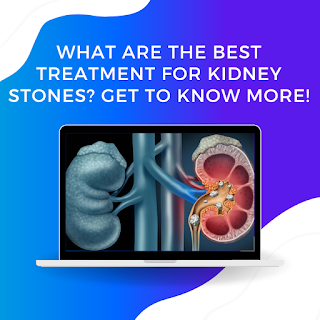What are the best treatment for kidney stones? Get to know more!
If a kidney
stone is suspected in you by top kidney specialist in Agra, you could
undergo diagnostic treatments like:
Your excretion of too many stone-forming minerals or insufficient
amounts of stone-preventing chemicals may be revealed by the 24-hour urine
collecting test. Your doctor might ask you to perform urine collections over
two consecutive days in preparation for this test.
Imaging. Your urinary tract may appear to have kidney stones on
imaging testing. Computerized tomography (CT) with high-speed or dual energy
may be able to detect even microscopic stones. Simple abdomen X-rays are less
commonly utilized since they have a higher chance of missing tiny kidney
stones.
Another imaging technique for diagnosing kidney stones is
ultrasound, a rapid and simple noninvasive examination.
Examination of stones that have already passed by best kidneydoctor in Agra. You might be requested to urinate through a filter to catch
stones you pass. Your kidney stones' composition will be determined via
laboratory analysis. The urinary tract contains the kidneys, bladder, and
ureters. Your doctor utilizes this information to identify the cause of the
kidney stones and to create a plan to prevent further kidney stones.
Ureters: The tubes bring urine from the kidneys to the bladder.
Bladder: It collects urine
Urethra: The urethra is a single tube by which urine in the bladder passes
out of the body.
The first stage in an evaluation is frequently imaging if your
symptoms point to kidney stones. An intravenous pyelogram, a form of abdomen
x-ray, served as the gold standard of care for many years (IVP). This has been
superseded by a kind of computed tomography (CT) termed unenhanced helical CT
scan in most medical facilities. Renal ultrasound could be utilized as an
alternative in some circumstances, such as when someone has poor renal or a dye
allergy to contrast agents.
Additionally, you will undergo blood examinations, including renal
function exams (creatinine, BUN). If a disease is suspected, a urine sample will
be sent along with a urinalysis.
Pain management is of utmost importance if you suffer from renal
colic, the severe discomfort brought on by kidney stones. A 2018 study of
numerous randomized studies examined the various painkillers used for patients
receiving emergency department care for severe kidney colic. It contrasted
paracetamol, a medicine related to acetaminophen, with opioids and nonsteroidal
anti-inflammatory drugs (NSAIDs), such as aspirin, ibuprofen, or naproxen.
Compared to paracetamol or opioids, the study found that NSAIDs provided
excellent pain management with fewer adverse effects. Prostaglandin production
is directly inhibited by NSAIDs, which decreases kidney blood flow &
ureteral contraction, and pain receptor activation.

.png)

Comments
Post a Comment